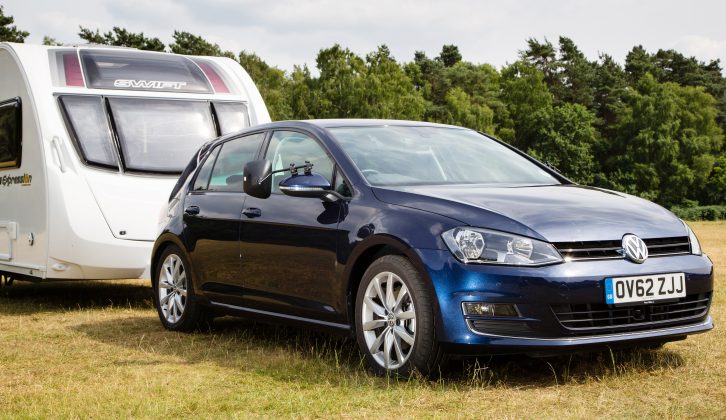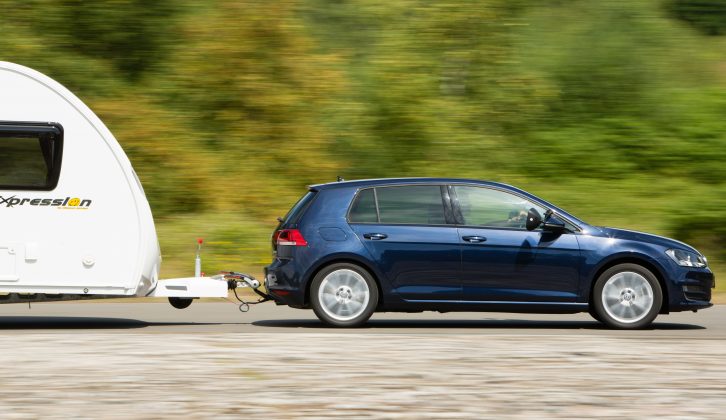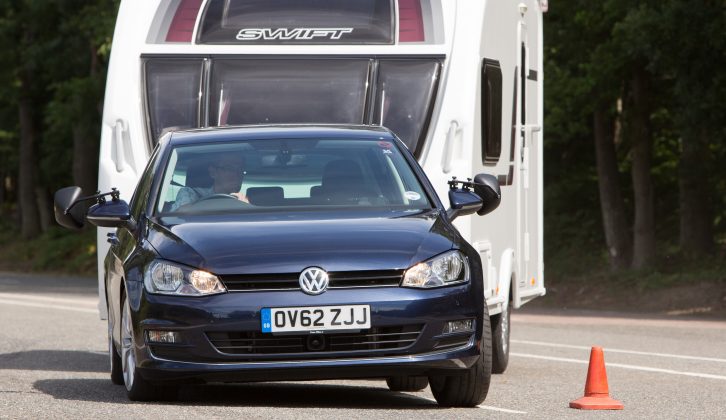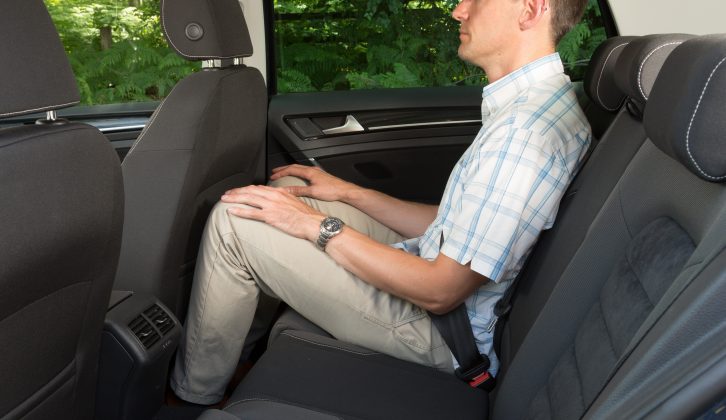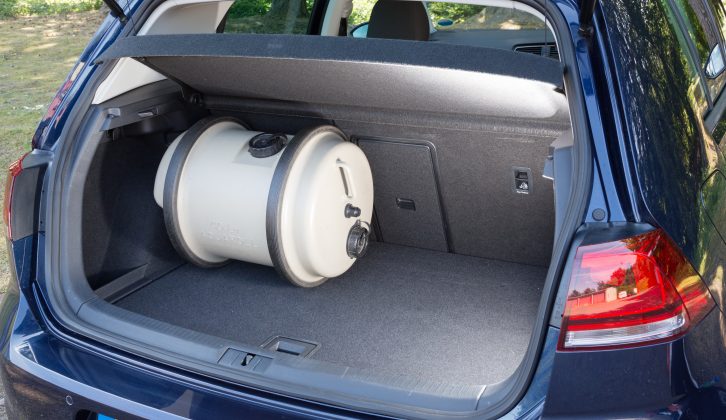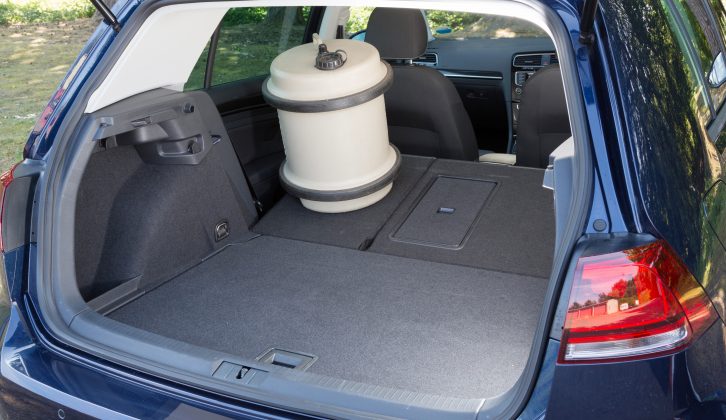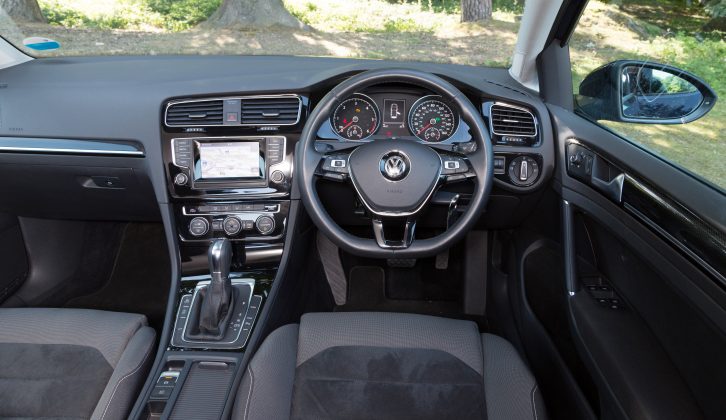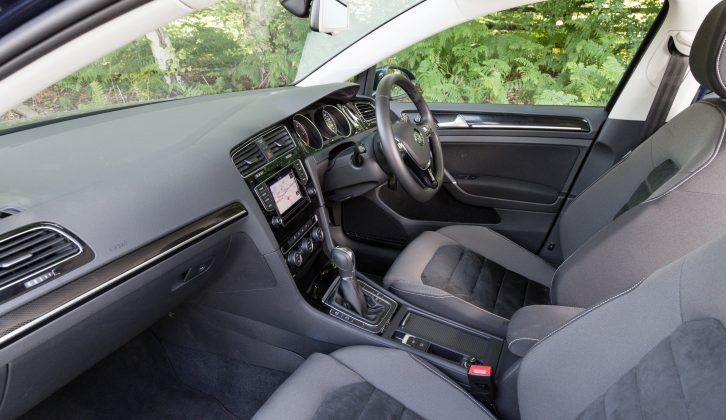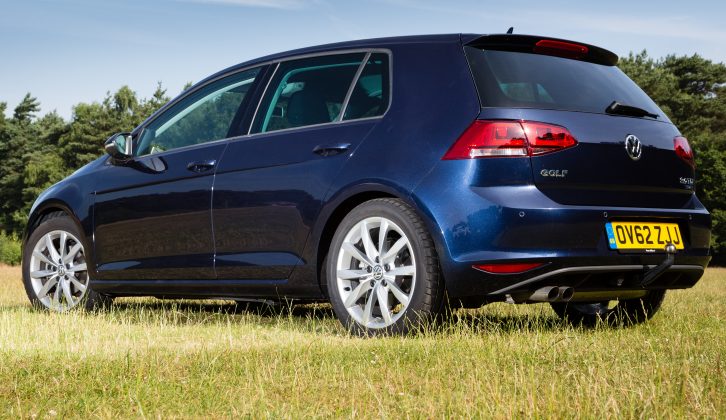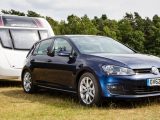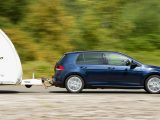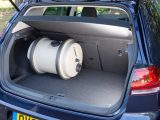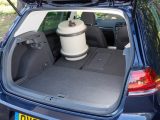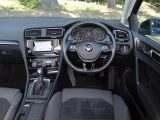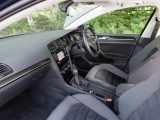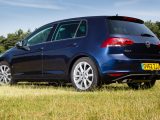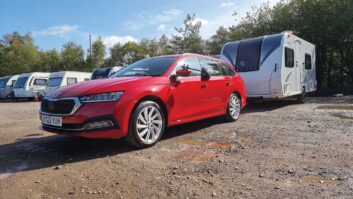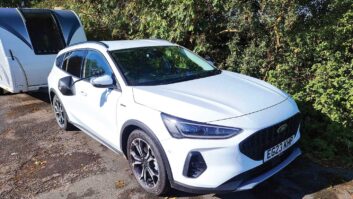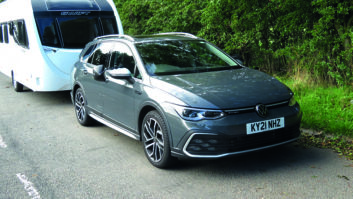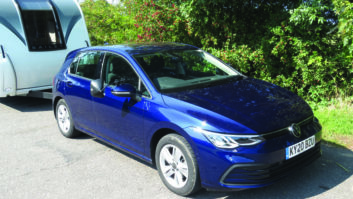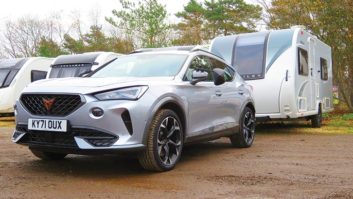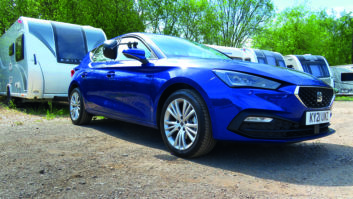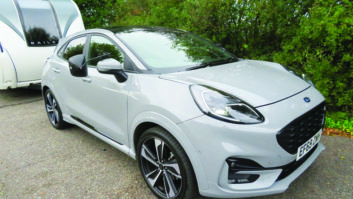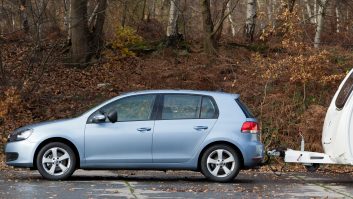Verdict
Through the years, the Volkswagen Golf has won more prizes at Practical Caravan’s Tow Car Awards than any other car our reviewers have tested, bar the Land Rover Discovery. It came close again in 2013, and having had the chance to put more miles on the VW, Practical Caravan’s team continues to be hugely impressed by the Golf’s depth of ability.
First and foremost, it tows superbly. The VW’s high-speed stability can stand comparison with much larger and heavier cars. We never had a nervous moment towing with the Golf, and finished journeys feeling relaxed and unflustered.
Should you find yourself in an emergency situation, the Golf’s reassuring brakes and willingness to change direction in a hurry will help you stay out of harm’s way.
In day-to-day driving, the Golf is entertaining on B-roads, but refined and quiet on the motorway. The GT spec’s sport suspension makes for a fairly firm ride at low speeds, but for the most part the Golf is comfortable to travel in.
Adult passengers may wish for a bit more room in the back, though, which is where the Golf loses out to the Skoda Octavia, the overall winner of the Tow Car Awards 2013. There’s less legroom than you’ll find in the back of an Octavia, and nowhere near as much luggage space.
What’s more, the Octavia offers better value than the VW. The nearest equivalent to the Golf tested here undercuts it by nearly £2000. For our money, that makes the Octavia the better buy. But if you don’t need the extra space, the Volkswagen Golf is a very capable tow car.
Pros
For a small car, the Golf has a respectable kerbweight and towing limit
It is very stable at motorway speeds and can keep an errant van under control
Its greatest strength may be refinement and it is also relaxing to drive
The resale values are high and insurance group is lower than for a Ford Focus
Cons
Although you get what you pay for, the price is high
Space for rear-seat passengers and for luggage pale next to a Skoda Octavia
The Volkswagen Golf has long been one of the best small tow cars, and the Mk7 continues that tradition. Although it was narrowly beaten by the Skoda Octavia in the 2013 Tow Car Awards, the Golf put up a very tough fight.
Practical Caravan’s experts have spent some time with the VW’s high-spec GT version on the test track and on familiar roads, towing and driving solo. It has a strong and efficient 2.0-litre diesel engine and the slick-shifting DSG transmission.
A car of this size and weight should cope well with smaller tourers, so Practical Caravan’s reviewers started work expecting good high-speed stability and a healthy turn of speed.
The Volkswagen Golf's high-speed stability can stand comparison with that of much larger and heavier cars
Towing
Small hatchbacks can be hit-or-miss as tow cars, but Practical Caravan’s reviewers have never driven a Golf that hasn’t been a hit. As it should be, the new car is the best yet.
Volkswagen’s brochure lists a kerbweight of 1375kg for this model but, when we did an earlier solo test, VW advised us to add 30kg for the five-door body style, giving a healthy 1405kg kerbweight. That means the Golf has a respectable 85% match figure of 1194kg. We wouldn’t recommend towing more than 100% of the kerbweight, however many years of towing you have behind you. The legal towing limit is 1600kg and the towball limit is 80kg.
What the facts and figures can’t show is how stable the VW feels at speed. Matched to a Swift Expression 442 with a maximum technically permissible laden mass (MTPLM) of 1254kg, the Golf proves to be a confidence-inspiring tug. At motorway speeds the Golf is solid and secure – stable enough to put some larger, heavier cars to shame.
The VW is also impressive on the test track, particularly in the emergency lane-change test. However much a caravan moves around behind it, the car seems unaffected. Even when pushed hard, the Golf rolls little and grips securely.
Practical Caravan’s testers would always take stability over speed, but the VW offers both. Accelerating from 30-60mph, as you might when joining the motorway, takes just 10.5 seconds when towing the Swift. It won’t take long to get back up to speed if you’re briefly held up by slower traffic, either, as accelerating from 50-60mph needs only 4.5 seconds.
The 2.0-litre diesel supplies plenty of brawn, pulling cleanly from low revs and building progressively through the mid-rev range. It’s well matched to the Direct Shift Gearbox. Strictly speaking, this is a twin-clutch mechanised manual, but it behaves much as a conventional automatic does. Gear changes are smooth and quick, especially in Sport mode.
The braking power is just as impressive, with a stopping distance of 9.8m from 30mph. Dry conditions at the track helped, but few cars stop as quickly or with as little drama.
The testers have no complaints about the Golf’s hill-start test either. Electronic parking brakes may be a love-hate feature, but they’re fans of how well the brakes hold the outfit still on steep slopes; you don’t have to yank the lever so hard that it comes off.
The parking brake releases the outfit smoothly on a 1-in-6 slope. Thanks to the DSG transmission, there is need to juggle clutch and throttle, and the VW pulled to the top of the hill without fuss.
The ride when towing slowly could be a tad smoother but it’s more supple as speeds rise. The Golf Mk7 is an excellent tow car.
Everyday Driving
Leave the caravan at home and the Golf continues to impress. Practical Caravan’s reviewers say that the Golf’s greatest strength may be its refinement. It is very quiet at motorway speeds, and the 2.0-litre diesel sounds distant. Wind and road noise remain in the background.
Head off the motorway and the Golf is responsive and agile. The steering is light but direct, lean in corners is well controlled and there’s plenty of grip. Although the car has a sensible image, it is fun to be behind the VW’s wheel.
That’s not to say it doesn’t do the dull things well, too. The DSG transmission makes the car relaxing to drive in heavy traffic and the compact size makes the car feel at home around town. Thick rear pillars compromise the driver’s view behind slightly, but for the most part it’s easy to see what’s around you.
The ride is a little firm at low speeds, but for the most part it combines comfort and control very well. GT-spec models come with sport suspension, which is 10mm lower than standard.
S- and SE-spec cars trade some sharpness for a softer ride, while the optional Adaptive Chassis Control (£800) gives drivers the choice of three suspension settings — Normal, Sport and Comfort. It may be pricey, but it’s an option worth considering, because switching among the modes makes a clear difference to how the car behaves.
As when towing, the VW Golf ticks almost every box as a solo drive.
Space
For most small hatchback buyers, the Golf will be practical enough, but it can’t compete with the amount of passenger or luggage space provided in a Skoda Octavia.
Still, Practical Caravan’s reviewers approved of the Golf’s high standard of fit and finish. There’s nothing adventurous about the dashboard, but everything has the look and feel of quality. Just as important, the controls are well positioned and easy to use, although we’d prefer to have the sat-nav screen mounted higher than it is.
There’s plenty of space for those in the front. Legroom in particular is so generous that very tall drivers can get comfortable. The wide range of adjustment for the seat and wheel will help people of all shapes and sizes find a suitable driving position.
Those in the back don’t have as much room to stretch out. Compared with most small hatches, the VW is spacious enough for rear-seat passengers, but it doesn’t come close to the Octavia’s benchmark. It’s good to see air vents to blow chilled air at rear passengers – we would not do without this feature.
Anyone trading in the previous Golf will notice that boot space has improved. It now has 380 litres to fill with all the seats upright, an increase of 30 litres, and the boot floor can be set to one of two levels.
A family of four will quickly fill that space when touring. The Octavia has a further 210 litres of luggage room, and the new Peugeot 308 also has the Golf well beaten for luggage space.
With the VW’s rear seats folded, the capacity rises to 1270 litres, although there is a slight slope to the floor.
The Practical Caravan VW Golf review revealed it to be practical, but some rivals offer more space for passengers, luggage or both.
Running Costs
You wouldn’t call the VW Golf cheap, but strong resale values help offset the relatively high initial outlay, report the reviewers from Practical Caravan. The price tag is the wrong side of £25,000, but What Car?’s used car experts predict the car will still be worth 48% of that after three years and 36,000 miles on the road.
Low running costs also help. The official combined economy of 62.8mpg is very frugal for a car with such strong performance, and we achieved 25.3mpg when towing with the Golf while pulling a caravan weighted to 85% of the kerbweight.
In terms of insurance, the 2.0 GT sits in group 19. That’s three groups lower than the equivalent Ford Focus.
You get plenty of kit if you choose GT spec. Included in the price are sport suspension, 17-inch alloys, front fog lights, sat-nav, cruise control which uses radar to maintain a set distance from the car in front, and front and rear parking sensors.
You’ll also find all the safety features you’d expect, including front, side and curtain airbags, plus another for the driver’s knees. The Mk7 has been rated a five-star car by safety experts Euro NCAP, with strong scores for adult and child protection, and praise for the advanced safety systems fitted to the car.
So while the Golf is pretty pricey, you get what you pay for.
Technical Specifications
| Engine Size | 1968 cc |
| Kerbweight | 1405 kg |
| 85% KW | 1194 kg |
| Towball Limit | 80 kg |
| Maximum Towing Limit | 1600 kg |
| Power | 148 bhp |
| Torque | 236 lb ft |
| Offical MPG | 62.8 mpg |
| CO₂ | 119 g/km |
